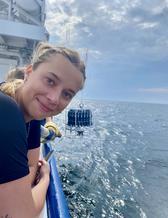
- What are you doing right now?
- Why did you want to study the master’s programme in oceanography?
- What is special about the programme?
- What is the most fun in the programme?
- What is special about studying in Gothenburg?
- Do you have any tips for those considering applying for the programme?
- What do you want to work with after graduation?
- Read more and apply!
Meet Michaela – Master's student in Physical Oceanography
Michaela Edwinson got a taste of physical oceanography when she studied the Bachelor’s programme in Marine Science at the University of Gothenburg. Right now, she’s in Capetown joining an international research project in Cape Cauldron off the South African coast.
What are you doing right now?
"I'm on my first year of the Master's programme in Physical Oceanography, and I just started working on my master’s thesis project which is about computing air-sea heat fluxes in the Cape Cauldron outside of the South African coast. Right now I am located in Cape Town, South Africa for about one and a half month joining the cruise of the international QUICCHE project, together with the University of Gothenburg’s Polar Gliders group led by professor Sebastiaan Swart. It’s quite spectacular, meeting scientists from all over the world, working with different type of instruments in an environment such as this one."

Why did you want to study the master’s programme in oceanography?
"I've always been fascinated by the ocean and had an interest in physics, so why not combine them? I studied the Bachelor’s programme in Marine Science at the University of Gothenburg and that’s where I got a taste of physical oceanography, and not just the physics that I started out studying when I came to Gothenburg."

What is special about the programme?
"The close contact with the professors and staff at the University is what I really like. The familiar feeling and their urge to help and include you is really special. The knowledge and experience of the professors in different fields give you a lot of opportunities to learn a variety of stuff. Your classmates will be from different parts of the world, so your peers will also come with different backgrounds that you can learn from."
What is the most fun in the programme?
"So far, the most fun has been going to South Africa, see and work with different instruments such as gliders and meet a lot of people in connection to that. I'm not even halfway through my trip here, and the research cruise to Cape Cauldron starts in just a few days, so I'm sure I will have many more highlights from my time here. We will stay on the ship in the Cape Cauldron for about a month and I'll have responsibilities such as computing heat fluxes and other data that we are collecting each day, apart from helping out with the different instruments onboard."
What is special about studying in Gothenburg?
"I'm from Sweden, but from a small town called Sigtuna. I moved to Gothenburg for education and because I love the closeness to the sea and atmosphere of Gothenburg that has a good mixture of city and nature, but without being too big."
Do you have any tips for those considering applying for the programme?
"The education is both demanding and rewarding. Once you decide to come to Gothenburg, a lot of opportunity is given to you if you take the chance. Ask the people that you meet at the department for advice, and there's never a question too much, people are so helpful."
What do you want to work with after graduation?
"I want to work in field in combination with analysis or hands-on with technical things. If travelling is included, no one is happier than me," says Michaela Edwinson.
Interview: Annika Wall


